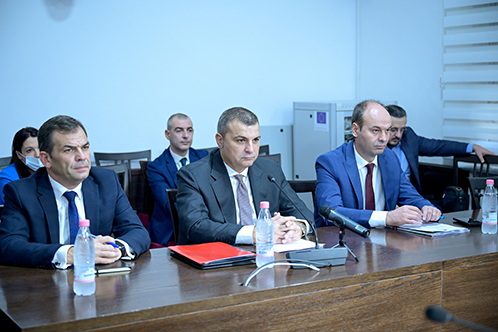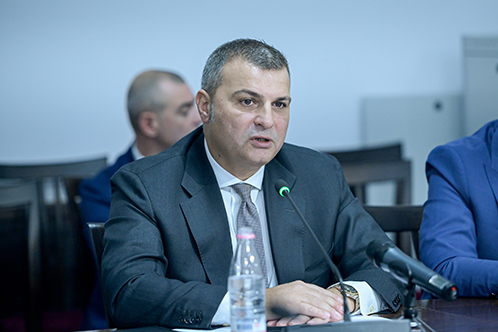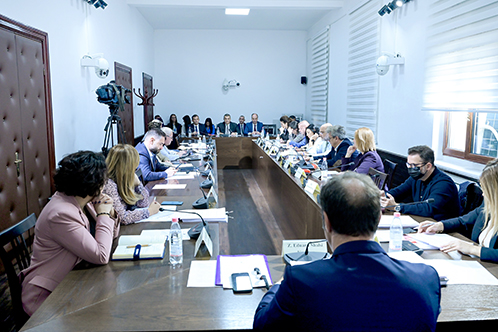BANK OF ALBANIA
PRESS RELEASE
Governor Sejko presents BoA’s opinion on the Draft Budget 2022 to the Parliamentary Committee on Economy and Finance
Publication date: 05.11.2021
Honourable Chair,
Honourable Members of the Committee,
First, I would like to thank you for the invitation to present to this Committee the opinion of the Bank of Albania on the 2022 draft budget.
This draft budget determines the fiscal policy stance for 2022, allocates the necessary funds for financing the development programmes, and introduces tax legislation for the next year. Therefore, the Bank of Albania has valued and continues to welcome the open discussion on the projections this draft budget is based on, the objectives included in it, and the instruments forecasted to achieve these objectives. I hope the opinion of the Bank of Albania will be an added value in this regard.

In compliance with the legal mandate, the opinion of the Bank of Albania on the draft budget 2022 will focus on issues, which are within the scope of our competence and expertise.
In more concrete terms, my comments will address the following fields:
- Trend and impact of fiscal policy on the economy;
- Public borrowing and its impact on the domestic financial markets; and
- Enhancing the effectiveness and sustainability of public finances.
First, I will summarise our vision on the development perspectives for Albania and the contribution that we, as policymakers, could provide in this regard.

1. Macroeconomic perspective, fiscal policy and budgetary projections
The draft budget 2022 empowers in the perspective of the Albanian economy rebound, after the dual shock from the earthquake and the pandemic, also in view of the continuous medium to long-term challenges that lie ahead.
The shocks we faced over the last two years were the biggest test to the economic, monetary and financial equilibriums of the country and to the stability of growth sources.

The Bank of Albania deems that the economic developments in 2021, and in particular: the high growth rates over the first half of year; the partial recovery in labour market indicators; the gradual improved balance sheets of private sector; inflation and exchange rate stability; as well as the increased lending to private sector; show that the Albanian economy is successfully dealing with this challenge. In addition, the fact that the volume of output in Albania, both in aggregate level and in most sectors, has exceeded the pre-earthquake and pre-pandemic level shows that the medium to long- term impact of both shocks on the economic growth sources is very likely to be low.
The easing of restrictive measures implemented to control the pandemic spread, the improved confidence of businesses and households, the increased foreign demand, coupled with the simulating monetary and fiscal policy fuelled the economic rebound. These policies, amid others, guaranteed the monetary and financial stability in Albania, bolstered lending at low cost to economic activity, and eased the financial burden on the private sector.
The Bank of Albania deems that the development perspectives for Albania remain positive and the economic recovery is consolidating. Therefore, our economic policies - both monetary and fiscal policies - should start to gradually orientate towards normalisation. This normalisation will serve to improving the macroeconomic equilibriums, increasing policy space to withstand potential adverse shocks in the future, and strengthening the financial sustainability of the country. The Bank of Albania finds that the optimum sequencing of this normalisation would result in turn in a fiscal consolidation, which is reach and supported by the gradual withdrawal of monetary stimulus. This approach provides the proper support to the recovery process and mitigates the fiscal risks originating from the growth of public debt.
Based on the above, allow me to share with you the following findings of the Bank of Albania:
The draft budget 2022 is based on the assumption for a positive and firmly economic growth, both over the course of 2022, and in the medium-term horizon. In particular, the draft budget envisages that budget revenues in 2022 will increase by around 8% from the expected level of 2021, reaching at 28.7% of GDP.
The Bank of Albania deems that the macroeconomic projections, which outline the budget, are realistic under their baseline scenario, although remaining on the upside to our projections. Also, projections on budget revenues for 2022, seems acceptable, but they take into account an expected positive effect from the enhancement of economy formalisation.
From this perspective, the Bank of Albania:
- Suggests the need for a continuous attention from fiscal authorities on the performance of revenues, aimed at identifying, in a timely manner, the possible negative differences between the fact and the plan, and taking the necessary measures for controlling both budget deficit and public debt.
- Encourages the timely and rigorous implementation of measures which support the formalisation of the economy. Our experience has shown that - despite their short-term costs - structural reforms yield long -term benefits to the country.
- Considers indispensable the finalisation and implementation of the Medium-Term Revenue Strategy at an earlier time possible. This strategy - amid others, should aim at simplifying the tax system, enhancing its stability; and avoiding the ineffective tax exemptions. Coupled with the strengthening of formalisation, it will enable the growth of income collection, improvement of competition, within and across sectors.
Second, the draft budget 2022 envisages the beginning of fiscal consolidation process. According to draft budget projections, budget deficit is programmed to reduce to 5.4% of GDP in 2022, against the expected 6.8% in the current year. Also, primary deficit is programmed to record a consolidation of 1.9 percentage points of GDP over 2022, while gross public debt is projected to reduce by 1.1 percentage points.
The Bank of Albania welcomes the beginning of fiscal consolidation during 2022. The speed of consolidation appeases to be conditioned by the upsurge of prices in international markets and the need to conclude the restructuring process. In their absence, the Bank of Albania deems that this consolidation should have been more ambitious. Also, we welcome the adoption of a numerical objective for the fiscal consolidation pace, being materialised through the inclusion in the Organic Budget Law of an objective on a primary positive balance starting from 2024.
In this light, the Bank of Albania:
- Encourages the adoption of relevant provisions in the draft budget, which enable the acceleration of fiscal consolidation momentum over the course of 2022, that is, the further reduction of deficit and debt - in case the budget revenues are higher than expectations, or in case the need for subsidies on both imports and energy results lower than the current assessment.
- Suggests the revision of the provisions in Article 7 of the Draft Law on the Budget 2022, enabling revenues in the form of grants designated for the financing of reconstruction of the damages from the earthquake be used to reducing the budget deficit.
- Encourages a faster pace for fiscal consolidation in the medium and long-term horizon.
- Assesses that this consolidation, in line with the Medium-Term Revenue Strategy, should be based a-ta greater extent - on the growth of revenues than on the shortening of public expenditures.
Third, the draft budget 2022, envisages public investments at 6.4% of GDP. This level is slightly lower than in the previous year, but it remains sufficiently high.
The Bank of Albania encourages the maintaining of spaces for capital investments in the budget structure of Albania. These investments are necessary for: the overall improvement of the country’s infrastructure; accelerating the pace of economic growth in the medium and long-term; and increasing the welfare of the society.
In this view, the Bank of Albania:
- Assesses that the discipline of current expenditures and the stable growth of public revenues’ base will establish the premises to maintaining the spaces for public investments, even in the presence of fiscal consolidation.
- Deems that the selection process of investment projects may be further improved, through the adoption of a formal assessment structure on their profitability in a timely manner.
2. Financial markets, budget deficit and public debt
The draft budget 2022 envisages the budget deficit level to be around ALL 101 billion, or 5.4% of GDP. This deficit is envisaged to be financed ALL 50 billion (or 2.7% of GDP) by domestic borrowing and at ALL 51 billion (or 2.7% of GDP) by external financing.
Financing in the domestic market is foreseen to be provided through the issue of securities. Meanwhile, external financing is expected to be provided as following: ALL 25 billion (or 1.4% of GDP) from external financing projects; around ALL 17.5 billion (or 1% of GDP) from the budgetary support of international partners; and the rest ALL 8.5 billion (or 0.3% of GDP) from the funds ensured by the expected issue of Eurobond in international markets over the course of 2021.
This Eurobond (expected at EUR 700 million or around ALL 85 billion) will be used for the following: ALL 34.1 billion for the payments of external debt over 2021, ALL 42.5 billion for the payments of external debt in 2022, and ALL 8.5 billion for financing budget deficit over the course of 2022. In absence of Eurobond, the Government would have decreased at a corresponding degree the planned expenditures during the period 2021-2022, or would have increased the borrowing in the domestic market.
The Bank of Albania assesses that this financing plan is reasonable, given the high levels of deficit and targeted borrowing from the Government in the 2021-2022 horizon. The entirely financing of these deficits in the domestic financial market would drive to an increase of interest rates and reduction of funds available for lending to private sector. Also, the Bank of Albania supports the objectives and work of the Ministry of Finance and Economy to further extend the maturity structure of public debt.
However, the Bank of Albania highlights that the increasing trend of both external borrowing and foreign currency borrowing, exposes the public debt, not only to the risk from the interest rates, also to the risk arising from the unfavourable fluctuations in the exchange rate. Therefore, the Bank of Albania deems that the financing structure of both deficit and budget should aim at a greater support on the domestic markets and currency in the medium and long term. This approach would reduce the probability and intensity of possible shocks in the future.
For this purpose, the Bank of Albania suggests:
- First, a revision of the provisions laid down in Article 10 of the Draft Law on the Budget 2022, which limit the borrowing in the domestic financial markets – designated for financing the budget deficit - at the maximum level of ALL 50 billion, and reduce this borrowing for maximally half of the quantity of possible revenues from privatisation over the year.
- Second, the continuation of the work on the expansion and further diversification of investors base in the domestic market. This objective should be fulfilled, amid others, through continuing the improvement programme on the functioning of secondary market, which in turn, drives to an increased interest of domestic investors.
- Third, the adoption of a more ambitious approach to reducing external debt in the medium and long-term horizon. This objective is in line - and becomes possible from - the primary objective on decreasing the level of public debt.
Allow me, in conclusion, to address briefly some suggestions of the Bank of Albania, which in our view, would support to enhancing the long-term sustainability and effectiveness of public finances.
3. Enhancing the effectiveness and sustainability of public finances
While assessing the draft budget 2022 as a balancing act between - on one side - the needs to supporting the economic recovery and ultimately reducing the consequences originated from both the earthquake and the pandemic, and - on the other side - the preservation and consolidation of the public finances sustainability, the Bank of Albania finds it appropriate to provide the following suggestions and recommendations.
On deficits in health and social insurance schemes
The draft budget 2022 projects that the deficit of the social and health security schemes, is expected to be at around ALL 101 billion or 5.4% of GDP. This level is equal to the 2022 budget deficit and around two times higher than the targeted budget deficit for 2024-2025.
Both social and health insurances schemes continue to constitute a considerable burden on the state finances. In this context, by considering also the unfavourable demographic trends, the Bank of Albania suggests the periodic revision of the pension scheme, health insurance scheme and other social insurance schemes, aimed at maintaining these schemes on a stable trajectory and affordable for the state budget.
On the management of Public - Private Partnership programmes
The draft budget 2022 envisages that payments from state budget and the liabilities that arise from concessionary contracts and PPPs will fall within the legal limitations, more concretely at 3% of tax revenues of the previous year.
Nevertheless, in line with our previous positions, the Bank of Albania suggests:
- Including an overall upper limit on the PPPs total value. This regulation would supplement the control of the level of potential risk that PPPs would have on the soundness of public finances.
- The integration of contracting and selecting of PPPs process with strategic program of investments, as identified in the long-term development programs of the country.
- Continuous improvement of professional capacities of units that manage the assessment, contraction and monitoring of these projects, particularly regarding legal and financial obligations that they pose to the budget.
On the pace of the realisation of budget expenditure throughout the year
Finally, the Bank of Albania reiterates the appeal for a better allocation on a timely manner of budget expenses throughout the year. The realisation of budget expenditures throughout the year continues to show more concentration in the fourth quarter. This phenomenon - repeated and dictated to a larger extent by the uneven realisation of public investments- creates unnecessary fluctuations throughout the year in liquidity indicators and interest rates in the domestic financial market.
Thank you for your attention!

 Linkedin
Linkedin
 Twitter
Twitter
 Youtube
Youtube
 Facebook
Facebook
 Flickr
Flickr
 RSS
RSS
 Subscribe
Subscribe
 Feedback
Feedback